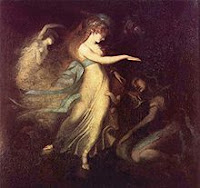I’m following Caroline’s lead in the business of shameless self promotion by showing you the book trailer I made for Dedication:
 And now we have that over with, I’ll share the secrets of my plotting process with you. First of all, I have a visit from the Idea Elf. The Idea Elf whispers in my ear something like “Why don’t you write a book about …” and then his colleague, the Plot Fairy, comes to visit.
And now we have that over with, I’ll share the secrets of my plotting process with you. First of all, I have a visit from the Idea Elf. The Idea Elf whispers in my ear something like “Why don’t you write a book about …” and then his colleague, the Plot Fairy, comes to visit.
 Yes, really. They are little people dressed in green and the Plot Fairy has lovely gauzy wings. They flit. They are cute. The Idea Elf tends to come around when I’m halfway through something and I have to tell him to go away and then he sulks. The Plot Fairy is a shy and wondrous creature whose visits are always unexpected and infrequent. I don’t know why the Idea Elf is male and the Plot Fairy female but it provides an excuse to post a pic of Orlando Bloom (who isn’t nearly as pretty as himself and the Idea Elf is rather more sort of green and wizened).
Yes, really. They are little people dressed in green and the Plot Fairy has lovely gauzy wings. They flit. They are cute. The Idea Elf tends to come around when I’m halfway through something and I have to tell him to go away and then he sulks. The Plot Fairy is a shy and wondrous creature whose visits are always unexpected and infrequent. I don’t know why the Idea Elf is male and the Plot Fairy female but it provides an excuse to post a pic of Orlando Bloom (who isn’t nearly as pretty as himself and the Idea Elf is rather more sort of green and wizened).
So here’s the latest from the Idea Elf:
As you know, a single woman, a friend or sister, was often invited to accompany the happy couple on their honeymoon. So Character A, companion to Character B, is in love with Mr. C. and then to her astonishment he proposes to Character B. B invites A to accompany them on their honeymoon. Now this is interesting because it could go a number of ways and so could they. It could be extremely sexy. It could be tender and reflective. It could be… calling the Plot Fairy. Come in, Plot Fairy. Plot Fairy, are you there?
Character A (a completely different A) is a woman whose reputation is dodgy because she’s had a string of failed engagements. Current fiance B turns up and begs to be set free because he’s gay and the guilt is driving him nuts. She suggests: a threesome … a drive in the park to clear his head … that he find her another potential husband superquick … Mayday, Plot Fairy. Are you receiving me?
Downton Abbey done right in the Regency: a houseful of conniving servants, upstairs-downstairs love affairs, and then … a body in the library (the butler done it with a blunt instrument!) … missing jewelry … a rude parrot … trapdoors … secret passages … a gaggle of women invited by the hero’s mother to try out for the position of bride … I’m actually writing this one and where is that Plot Fairy when you need her?
A terrible virus attacks the hot Dukes of Regency London, turning them into small brown dogs. The plucky heroine, an amateur scientist, joins forces with a renegade doctor to save the flower of England’s aristocracy but her heart is torn between him and a hot Duke whose DNA may provide the cure.
Now, are there any of these you’d actually want to read?




